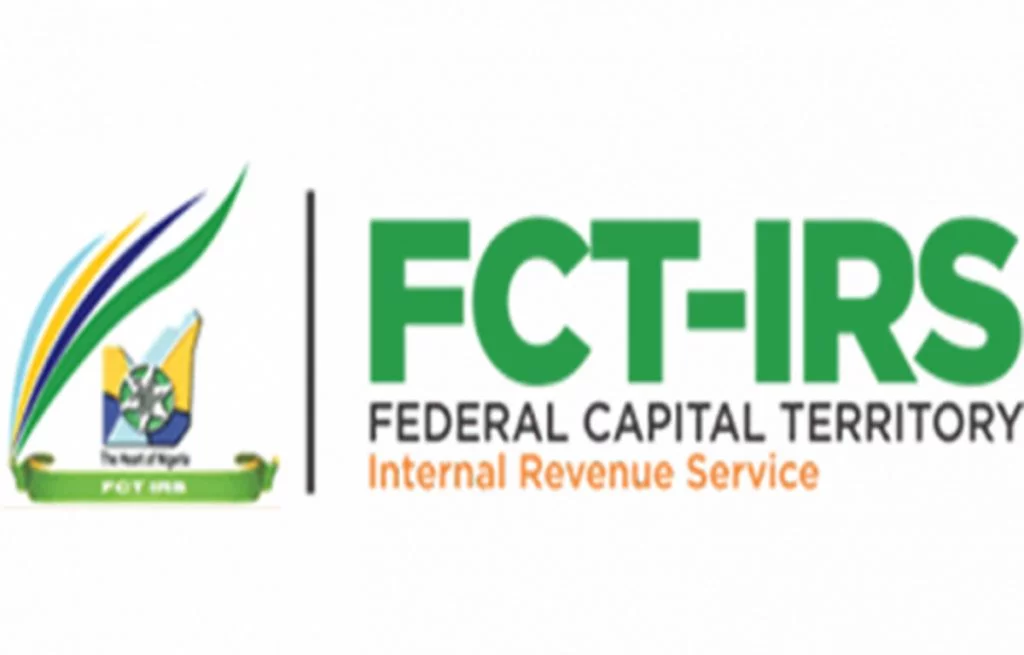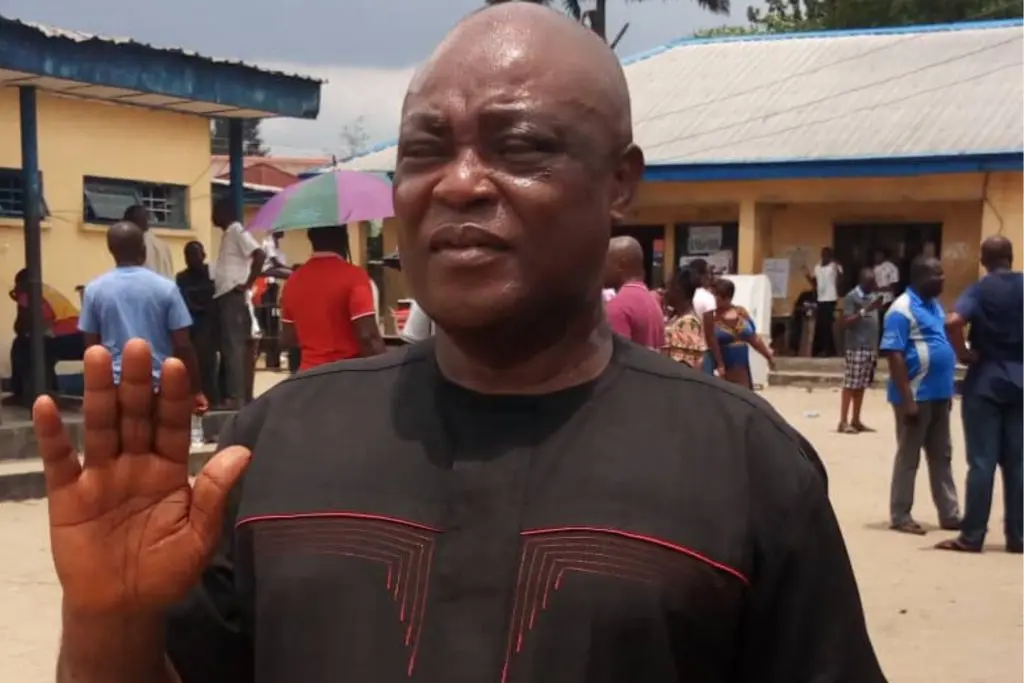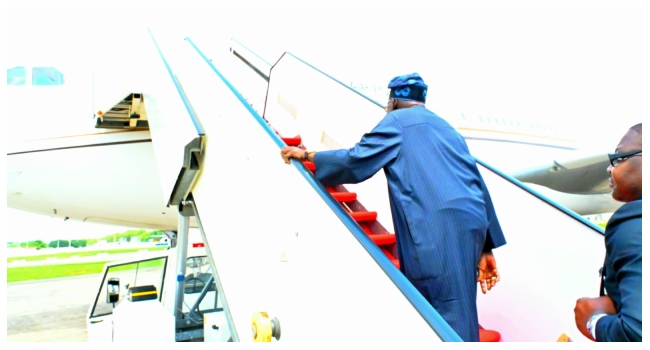News
Tax returns: FCT-IRS gives MDAs, employers of labour 3-week ultimatum
Published
3 months agoon
By
Ekwutos Blog
The Federal Capital Territory Internal Revenue Service, FCT-IRS, has called on private companies, Ministries, Departments and Agencies, MDAs, and other employers of labour in the territory to file their employee annual tax returns for 2024.
The acting Executive Chairman, Michael Ango, made the call in a statement in Abuja on Sunday, saying that the employers have up to January 31 to comply.
According to the statement by the FCT-IRS’ Head of Corporate Communications, Mustapha Sumaila, the returns should be filed using the prescribed forms provided by the service.
The FCT-IRS boss said this was in compliance with Section 81 of the Personal Income Tax Act, PITA, 2011 (as amended) and the Pay As You Earn, PAYE, Regulations.
Ango explained that the PITA Act mandates all employers of labour in the FCT to file annual returns of all emoluments paid to their employees and the total taxes of the preceding year, not later than January 31 of every year.
He had during the 2025 stakeholder’s engagement, emphasised that filing of employee annual returns by all employees was mandatory as provided by law.
According to him, failure to file the returns would attract penalties and other sanctions, which the FCT-IRS would not hesitate to impose on any defaulters.
He reiterated that the best form of compliance is voluntary, which the FCT-IRS expects from all taxpayers in the FCT.
“I, therefore, enjoined all private organisations, MDAs, government owned enterprises, including sole proprietorships who are employers of labour in the FCT to comply with their tax obligations to avoid sanctions.
“More importantly, the support will contribute to the development of the FCT and the efforts of the Minister of FCT, Mr Nyesom Wike, to transform the territory into a modern city,” he said.
You may like


PRESIDENT TINUBU CONDEMNS LATEST ATTACK IN PLATEAU, CHARGES GOVERNOR MUTFWANG WITH RESOLVING UNDERLYING COMMUNAL ISSUES


Wike hails 95% implementation of FCT 2024 budget, unveils key projects


Benue Govt moves to block Peter Obi’s visit amid Alia’s defection rumours


Nasarawa Assembly confirms new clerk, deputy


Rivers: Refund N300m Fubara gave you – Ibas tells NBA


War: Ukraine loses 235 soldiers in 24 hours
News
‘Ijaws not weak’ – Eze warns Wike, alleges plot to destabilse Bayelsa PDP
Published
10 hours agoon
April 14, 2025By
Ekwutos Blog
A Chieftain of the All Progressives Congress, APC, Eze Chukwuemeka Eze, has warned the Minister of the Federal Capital Territory, FCT, Nyesom Wike, not to mistake the peaceful nature of Ijaw people for weakness.
According Eze, Wike must desist from meddling into the politics of Bayelsa State.
The party chieftain warned the Minister that Bayelsa people do not play politics of betrayal, gangsterism and bitterness.
He advised the minister to be wary of the dangerous path he allegedly wants to toe which could destabilize and distract the administration of Governor Douye Diri of Bayelsa State.
In a statement in Port Harcourt over the weekend, Eze, a former member of the APC Legacy media team, hailed Diri for nipping in the bud, the alleged ”evil and anti democratic plot by Wike to import political violence, thuggery, politics of rancour and acrimony into Bayelsa State.
Eze alleged that “Wike is busy plotting to replicate [the suspension of Gov Fubara, his deputy and lawmakers] by President Bola Tinubu, in Bayelsa State.
“So, plotting to import ground-swelling violence to Bayelsa, envisaging a declaration of another infamous state of emergency, is a ruse, that can never happen in the State,” Eze added.
“Governor Diri cannot stand aloof and watch Wike perpetrate dastardly acts in Bayelsa State.
“I urge Wike to bury the thought of fueling crisis in the Bayelsa PDP, with the hope of allowing the attendant consequences to snowball into a state-wide political violence.
“I caution Wike to desist from his infantile thinking and hallucination, and wake up to the realization that no amount of devious plots would make President Tinubu, to declare a state of emergency in Bayelsa State.
“With the ceaseless and senseless killings in the Plateau, Edo, Zamafara and other States, Wike ought to have advised Tinubu to declare a state of emergency in Nigeria to justify his illegal declaration of emergency in Rivers State.
President Tinubu should not be arm twisted to believe that Diri’s opposition to hosting of the mega rally in support of him and Wike as well as the inauguration of a political group, ‘The New Associates,’ in Bayelsa, is an affront on Mr President’s political interest, because that has been the tactics of Wike, just to curry favour from the presidency.
“Wike knows that Bayelsa is the cradle of the Ijaw nation, warning that their peaceful nature should not be mistaken for weakness, as no individual, in the name of playing dirty and do or die politics, has monopoly of violence or brain box of inciting unrest. “
News
Tinubu Not In France To See Doctors – Presidency
Published
11 hours agoon
April 14, 2025By
Ekwutos Blog
Tinubu left Nigeria on April 2, 2025 for for Paris, France on a short work visit, according to presidential spokesman Bayo Onanuga.
Presidential aide Daniel Bwala says contrary to social media speculations, President Bola Tinubu is not in France for medical treatment.
“Sometimes on social media, somebody will be tweeting, you don’t even know who the person is; it can be somebody who has mental health somewhere. You just see that information is coming out.
“The president did not go to see a doctor; he’s on a working visit and we have been publishing his activities,” he said on Channels Television’s Sunday Politics.
Tinubu left Nigeria on April 2, 2025 for for Paris, France on a short work visit, according to presidential spokesman Bayo Onanuga.
In a video shared by the Presidency, Tinubu was seen greeting top government officials before boarding the presidential aircraft.
According to Onanuga, Tinubu would use the retreat to review the progress of ongoing reforms and engage in strategic planning ahead of his administration’s second anniversary.
He said the president is expected in the country by April 16, 2025.
News
Ebonyi land dispute: Lawyer petitions CDS, DSS, CP, others over attacks in Amasiri
Published
12 hours agoon
April 14, 2025By
Ekwutos Blog
Activist lawyer, Maduabuchi Idam, has petitioned the Chief of Defence Staff, Christopher Musa, Commandant Nkwegu Military Cantonment in Abakaliki, Director General of the Department of State Service, and Commissioner of Police in Ebonyi State over military aggression in Amasiri, Afikpo in Ebonyi State.
Amasiri and Oso Edda communities have been at war following a clash over ancestral lands.
The attack, which targeted Ama-iyime and Ozara-Okangwu of Amasiri, saw several properties worth millions of naira burnt while several other valuables were also looted in the process.
Last week, military personnel had stormed the Amasiri community in large numbers over the clash between both communities.
However, Idam lamented that the military incursion brought about brutality while aggression reigned freely against the Amasiri community.
The petition, titled “Re-Emergence of Military Invasion, Brutality, and Aggression Reign Freely Against My Community, Amasiri,” reads:
“The above subject refers.
“As a civil rights and public interest lawyer of Amasiri indigene, I write in pensive but helpless emotion to yet again draw the attention of well-meaning Nigerians and the authorities to the above subject matter, yearning for urgent intervention.
“The crisis between Oso Edda and Amasiri in Ebonyi State, which has regrettably occasioned the loss of several lives and properties, has continued to pose tension, hostility, and anxiety among the two neighbouring communities (Oso Edda and Amasiri) in Ebonyi State, despite efforts by Amasiri indigenes to pursue amicable settlement options only in resolving the matter, even in the face of provocations.
“Quite disturbing is that on 11th April 2025, the stakeholders of Amasiri, in pursuance of their resolve to seek a peaceful alternative to the resolution of the conflicting issues with their Oso Edda neighbour, attended a peace committee set up by the Commissioner of Police, Ebonyi State, following an invitation for that purpose, which was also attended by several other stakeholders in the old Afikpo Zone.
“Unfortunately, the Oso Edda neighbouring community refused, ignored, and completely rebuffed the invitation to attend the peace committee and instead seized the opportunity to again embark on another round of attacks against certain communities in Amasiri while her stakeholders were away in Abakaliki seeking a peaceable settlement to the conflicting issues.
“An incident that has triggered the already existing tension, anxiety, and unrest among the once most blissful and quiet community of Amasiri in Ebonyi State.
“While Amasiri indigenes and visitors who identify with her are targeted for onslaught by their estranged Oso Edda neighbouring community, who are now on a rampage along the Okigwe-Afikpo federal highway, waylaying vehicles and fishing out commuters who are either of Amasiri origin or identify with Amasiri. This coordinated aggression is freely carried out uninterruptedly as a result of tacit silence from the government of Ebonyi State.
“More worrisome is that there is a totally unprovoked, unwarranted, and needless military resurgence in my community, Amasiri. Overnight, the military, reportedly detailed from Nkwegu Barracks, reinvaded yet again my community, breaking homes, destroying properties, arresting the young and old, and shooting sporadically in a totally peaceful area, without any news of any form of attacks from Amasiri or crisis in Amasiri, while leaving the aggressor, her Edda neighbouring community. This unrest is reportedly aided, sponsored, and coordinated by powerful politicians in Edda zone who have deployed their contacts in government to set the military at all costs against my people in Amasiri, just as a bait to secure a major pogrom or massacre of Amasiri people, simply to achieve their age-long desire to take over her ancestral land.
“The public is hereby notified that there is no crisis nor violence in Amasiri, and her people have not in the least behaved in any manner to warrant a military presence.
“I am constrained to yet again call on Nigerians to speak against the ongoing needless military aggression and urge the Chief of Defence Staff and the Commandant Nkwegu Military Cantonment to withdraw the military operation in Amasiri, which is totally unwarranted and unprovoked, even as I prevail on the Governor of Ebonyi State, His Excellency Francis Ogbonnia Nwifuru, to quickly intervene in this matter to save the lives and properties of the peaceful people of Amasiri.
“The governor is here again informed that there is total unrest in Amasiri, which is occasioned by the military; homes are deserted, farmlands are also not safe, and economic activities have been halted as anxiety and tension now possess the hitherto quiet and peaceful land. The governor is urged to most urgently break the deafening silence and intervene in the matter to restore peace in Amasiri.
“In a loud but very helpless voice, I urge the governor of Ebonyi State to quickly and directly address the situation personally as the Chief Security Officer of the state to curtail the ongoing intimidation, harassment, and prevent a possible carnage on the defenceless and vulnerable people of Amasiri.
“Let the whole world know that there was no reason for the resurgence or re-invasion of the military. The people have remained peaceful and have been attending all the peace meetings called for by the authorities in search of peace.
“The military re-invasion in Amasiri remains unlawful, ill-motivated, self-serving, unwarranted, illegal, unprovoked, and must be condemned by every Nigerian.”

PRESIDENT TINUBU CONDEMNS LATEST ATTACK IN PLATEAU, CHARGES GOVERNOR MUTFWANG WITH RESOLVING UNDERLYING COMMUNAL ISSUES

Wike hails 95% implementation of FCT 2024 budget, unveils key projects

Benue Govt moves to block Peter Obi’s visit amid Alia’s defection rumours
Trending

 Trending6 months ago
Trending6 months agoNYA demands release of ‘abducted’ Imo chairman, preaches good governance
- Business6 months ago
US court acquits Air Peace boss, slams Mayfield $4000 fine

 Politics6 months ago
Politics6 months agoMexico’s new president causes concern just weeks before the US elections
- Entertainment6 months ago
Bobrisky transferred from Immigration to FCID, spends night behind bars
- Entertainment6 months ago
Bobrisky falls ill in police custody, rushed to hospital

 Politics6 months ago
Politics6 months agoRussia bans imports of agro-products from Kazakhstan after refusal to join BRICS

 Politics6 months ago
Politics6 months agoPutin invites 20 world leaders
- Politics1 year ago
Nigerian Senate passes Bill seeking the establishment of the South East Development Commission.

